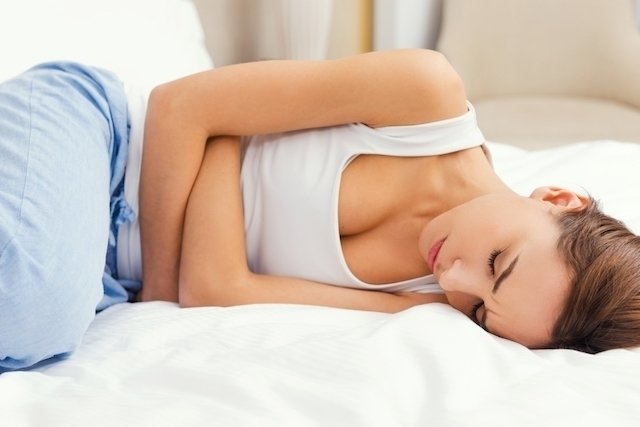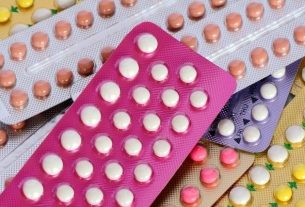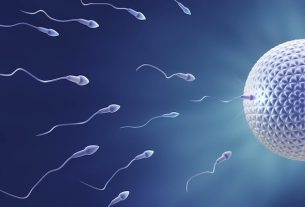Some symptoms that indicate that menstruation is about to start are increased breast sensitivity, mood changes, abdominal swelling, fluid retention, headache and increased appetite.
These changes, known as PMS symptoms, are normal and usually occur every month, remaining until the end of the fertile age, which occurs around 45 to 50 years of age, when menopause appears.
To alleviate these symptoms, the use of medication or the practice of activities that promote relaxation, such as physical activity, yoga or massage, for example, may be recommended. Check out how to alleviate the main symptoms of PMS.

How to know if your period will come
The main symptoms that your period will start are:
- Abdominal swelling;
- Liquid retention;
- Headache or migraine;
- Sudden change in mood;
- Irritability;
- Tiredness;
- Indisposition;
- Anxiety;
- Emotional disorders;
- Swollen and painful breasts;
- Appearance of pimples;
- Increased appetite.
Signs of menstruation usually appear due to hormonal changes and can be alleviated with the use of anti-inflammatory medications, such as Ponstan, or antispasmodics and analgesics such as Buscopan or Atroveran, for example.
Furthermore, practicing activities that promote relaxation also helps to reduce symptoms, and it may be interesting to practice physical activities, walk in the park or do meditation, for example. Find out how to relieve menstruation symptoms.
Symptoms of the first menstruation
The first menstruation, also known as menarche, generally occurs around the age of 12 and is marked by the appearance of some signs and symptoms as a consequence of some hormonal changes, such as the appearance of pubic and armpit hair, enlargement of the hips, appearance pimples and abdominal pain, for example. See how to identify that your first period is approaching.
Menstruation calculator
In addition to the symptoms, it is possible to know when your period will come by knowing how many days your period normally lasts and when your last period was. If you want to know when your period will come, enter your details below:
How to relieve menstruation symptoms
To alleviate menstruation symptoms, the use of anti-inflammatory and analgesic medications may be recommended, as they can help relieve cramps, back pain and headaches. In addition, practicing physical activity, eating more fiber and drinking plenty of fluids during the day also help alleviate menstruation symptoms. See more tips for relieving menstruation symptoms.
What could be late menstruation?
Delayed menstruation is not always a sign of pregnancy, as other situations such as excessive stress, strong emotions, hormonal changes or even excessive caffeine consumption can interfere with the menstrual cycle. Therefore, it is important that the gynecologist is consulted when menstruation is late so that the cause can be identified and treatment can be started, if necessary. Check out the main causes of late menstruation.
Bibliography
- SCHOEP, Mark E. et al. The impact of menstrual symptoms on everyday life: a survey among 42,879 women. American Journal of Obstetrics & Gynecology. Vol.220, n. 6. 569.e1-569.e7, 2019
- BRAZILIAN FEDERATION OF GYNECOLOGY AND OBSTETRICS ASSOCIATIONS & BRAZILIAN SOCIETY OF FAMILY AND COMMUNITY MEDICINE. Premenstrual tension. 2011. Available at: <https://diretrizes.amb.org.br/_BibliotecaAntiga/tensao_pre_menstrual.pdf>. Accessed on 03 Dec 2019
- BRILHANTE, Aline VM et al. Premenstrual syndrome and premenstrual dysphoric syndrome: current aspects. FEMALE. Vol. 38, n.7. 373-378, 2010
- SOGIMIG. Manual of Gynecology and Obstetrics. 5th ed. Belo Horizonte: Coopmed, 2012. 25-48.

Sign up for our newsletter and stay up to date with exclusive news
that can transform your routine!
Warning: Undefined array key "title" in /home/storelat/public_html/wp-content/plugins/link-whisper-premium/templates/frontend/related-posts.php on line 12
Warning: Undefined array key "title_tag" in /home/storelat/public_html/wp-content/plugins/link-whisper-premium/templates/frontend/related-posts.php on line 13



